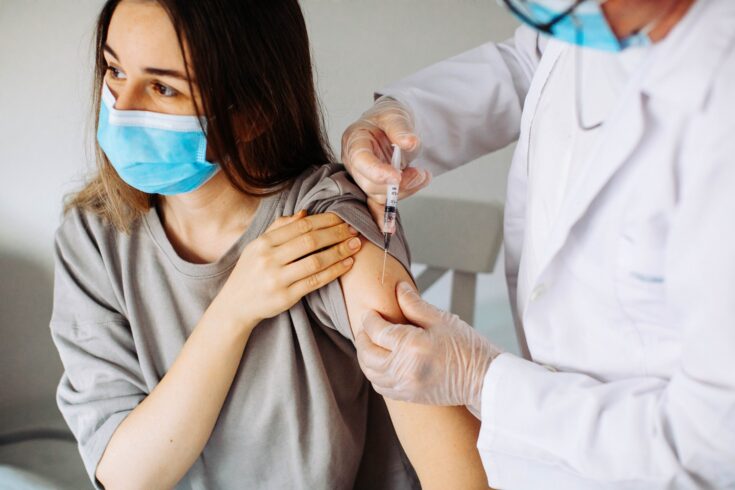A new clinical trial, OCTAVE DUO, investigates if a third vaccine dose for people with weakened immune systems gives a stronger immune response than two doses.
The £2.2 million study is co-funded by UK Research and Innovation (UKRI) and the government’s vaccine taskforce and led by researchers at the University of Glasgow and University of Birmingham.
The new research is an extension to the ongoing OCTAVE trial, currently analysing immune responses to COVID-19 vaccines in a wide range of people from around the UK. The trial examines those who have weakened immune systems due to underlying health conditions or prescribed medications, such as cancer, inflammatory arthritis and kidney and liver disease.
Measuring antibody responses
The OCTAVE trial published preliminary data today showing that 40% of people in these groups mounted a low, or undetectable, immune response after two doses. The level of antibody response varies between the groups studied. T cell response, another key part of the immune response, was similar to the response in healthy participants.
Up to 1,200 patients who are already involved in the OCTAVE study or who have other at-risk conditions in parallel studies will be recruited. These include patients who had a low or absent immune response after two doses of vaccine (Oxford/AstraZeneca or Pfizer). They will be given a third booster (of Pfizer, Moderna or Novavax) to see whether this will give them sufficient protection.
The study will analyse in detail their immune response to the vaccine and the durability of this response. They will also use health care records to determine whether any participants are subsequently diagnosed with SARS-CoV-2.
Alternative protection approaches
The results will help to predict which people could benefit most from a third vaccine dose and identifying groups who still do not produce a sufficient immune response, who could benefit from alternative protection approaches.
Patient cohorts included in the study are people with:
- lymphoid malignancies
- immune mediated inflammatory diseases (including rheumatoid arthritis, psoriatic arthritis, vasculitis and inflammatory bowel disease)
- renal disease
- solid tumours (including breast and lung cancers)
- haematopoietic stem-cell transplantation
- hepatic and intestinal disease
- primary immune deficiency.
Initial results are expected in autumn, to inform the UK’s booster strategy. The study will follow the patients to mid-2022 and offer more detailed information at that stage about the immune responses that develop in these groups.
An instrumental new study
Professor Iain McInnes, from the University of Glasgow, who leads the OCTAVE and OCTAVE DUO studies, said:
It is hugely important for us to urgently understand the effectiveness of COVID vaccines in people who have immune-mediated inflammatory diseases, cancer, and diseases of the kidney or liver.
Our first study to answer this question is the OCTAVE study which has shown that there is a group of patients who may not mount a sufficient immune response.
We are pleased to now roll out the OCTAVE DUO trial, to investigate the effects of a booster dose on this particular group of patients who have shown an undetectable or low vaccine response. We hope to provide answers to this very important unanswered question.
Professor Pam Kearns, from the University of Birmingham and is co-ordinating both OCTAVE and OCTAVE DUO, said:
The pandemic has been particularly concerning for millions of people in the UK who have conditions or long term illnesses which place them at greater risk of severe illness and death from COVID-19.
Together with our preliminary findings from OCTAVE, this new study will be instrumental in helping inform how best to vaccinate patients with chronic conditions, and protect them from COVID-19 infection in the future.
Health and Social Care Secretary Sajid Javid said:
Vaccines have built a strong wall of defence in the UK and this is allowing most of us to learn to live safely with COVID-19.
We know some people may get less protection from the vaccine than others, so we are planning for a booster programme in the autumn, prioritising those most at risk.
This new study will play an important role in helping to shape the deployment of future vaccines doses for these specific at-risk groups.
Dr Jonathan Pearce, Director of the COVID-19 Response at the Medical Research Council, part of UKRI, said:
While most of us are relieved to be vaccinated to protect ourselves and those around us, today’s results will be of concern for the subset of people with immunosuppression for whom the vaccine didn’t trigger a large response.
This new study of giving third jabs to this group is critical research which we hope will deliver a much-needed immunity boost or identify those who could benefit from other interventions.
One of the real strengths of the UK’s scientific response to the pandemic has been the way that we’ve assembled teams of experts to lead cutting-edge studies like this, to inform our vaccine roll-out and government decision-making in real time.
Read more about the preliminary OCTAVE trial results published today.

